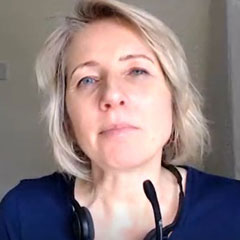Penny Spikins, Professor in the Archaeology of Human Origins, Department of Archaeology
Penny was first fascinated by human origins after visiting Upper Palaeolithic cave art sites when she was eleven.

Her first degree and PhD were at Cambridge and she later took up a lectureship position at the University of Newcastle before moving to the University of York where she is now a professor of the archaeology of human origins.
Her research focuses on how archaeological evidence can contribute to our understanding of the biological and evolutionary basis for altruism, compassion, tolerance and emotional sensitivity and how the evolutionary past can help us to understand modern emotional well-being.
email: penny.spikins
Our 60-second interview with Penny:
Could you please tell us what work you do in the field of mental health?
My research focuses on the origins of our modern minds in the very distant past. I'm interested in what archaeological evidence can tell us about how and why our uniquely human emotions emerged and why they were so important. I'm also interested in the evolutionary context of how autism fits into human societies.
What do you find most rewarding and inspiring in this work?
I really enjoy the public engagement elements, particularly when people say something I've said or published makes a difference to their lives.
What is the most challenging or complicated aspect of this work?
Keeping up to date with all the exciting things that are constantly being published in this area!
What impact do you hope your work is having - or can potentially have?
I can't help but feel that understanding how what we today often see as emotional vulnerabilities (like compassion) were what made humans successful in the past is important today. Believing (wrongly) that rationality or intelligence was central to human progress doesn't seem to have led our modern societies down an emotionally healthy path, and we might perhaps look at ourselves differently in order to do things differently.
Could you share with us one piece of advice that you follow for your own mental health?
I tend to try to remember that as stone age people living in a modern world we are bound to find it emotionally challenging, muddling through with 'good enough' is doing just fine.